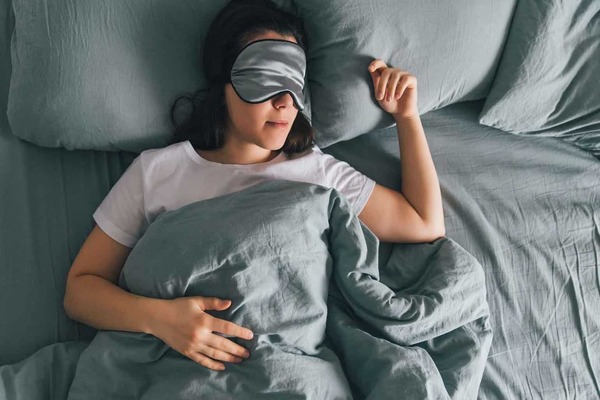Getting a good night’s sleep can seem unattainable in today’s fast-paced world. With the constant demands of work, family, and technology, many of us find it difficult to quiet our minds and fall into a peaceful slumber.
If you’re struggling to get the rest you need, you are not alone. Sleep disorders affect millions of people worldwide, but the good news is that there are steps you can take to improve your sleep hygiene and regain control of your nights.
Here are ten proven strategies that can help you achieve a better night’s sleep:
Establish a Consistent Sleep Schedule
Establishing a regular sleep schedule, which involves sleeping and waking up at the same time every day, including weekends, is highly advantageous for your body. By doing so, you can regulate your body’s internal clock and enhance the quality of your sleep.
This means that you will feel more refreshed and energized throughout the day and will be able to function at your best the whole day.
Create a Relaxing Bedtime Routine
It’s important to wind down before bed to have a good night’s sleep. You can do this by engaging in activities that promote relaxation such as reading, listening to soothing music, or taking a warm bath.
However, it’s best to avoid screens such as phones, tablets, and computers at least an hour before bedtime. This is because the blue light that these screens emit can disrupt your body’s natural sleep-wake cycle.

Make Your Bedroom a Sleep-Friendly Environment
Maintaining a cool, dark, and quiet environment is essential to create a sleep-friendly ambiance in your bedroom. This can be achieved by adjusting the temperature, switching off all electronic devices, and minimizing light exposure.
In addition to this, investing in a comfortable mattress and pillows can significantly enhance your sleeping experience, by providing adequate support and comfort to your body.
You may consider using blackout curtains or a white noise machine to eliminate any disturbances disrupting your sleep. These tools can effectively block out any external noises or light, hence promoting peaceful and restful sleep.
Watch What You Eat and Drink
To ensure a comfortable and uninterrupted sleep, avoiding consuming heavy meals, spicy foods, and excessive fluids before bedtime is advisable. Such foods can cause discomfort and disrupt your sleep, making it difficult for you to have a restful night.
Instead, it is recommended to opt for a light snack if you’re hungry. Additionally, you may try drinking herbal tea or warm milk to promote relaxation, helping you to drift off into peaceful slumber.
Limit Caffeine and Alcohol Intake

If you’re having trouble sleeping, it’s important to be mindful of what you consume before bedtime. Avoiding caffeine and alcohol can be especially helpful in promoting a healthy sleep cycle. Caffeine is a stimulant that can keep you awake and alert, making it difficult to fall asleep and stay asleep.
Alcohol, on the other hand, can initially make you feel sleepy, but it can disrupt your sleep later in the night, leading to frequent awakenings and a less restful night’s sleep overall. By avoiding these substances before bed, you can increase your chances of getting the restful and rejuvenating sleep your body needs.
Exercise Regularly
Engaging in regular physical activity can have a positive impact on the quality of your sleep. To improve your sleep, try to aim for at least 30 minutes of moderate exercise on most days of the week.
However, avoiding vigorous exercise close to bedtime is recommended as it can be stimulating and may interfere with your ability to fall asleep.
Manage Stress and Anxiety
To calm your mind and prepare your body for sleep, there are several stress-reducing techniques that you may find helpful. Deep breathing, meditation, and progressive muscle relaxation are some techniques that you can practice.
These methods can help you release tension and reduce stress levels, making it easier to fall asleep. Another great way to clear your mind before bedtime is to keep a journal by your bedside. You can jot down any worries, thoughts, or to-do lists that may be occupying your mind, allowing you to let go of them and relax.
Limit Naps During the Day
While napping can be refreshing, it is important to be mindful of the timing and duration of your nap. Long naps or napping late in the day can interfere with your ability to fall asleep at night.
Therefore, better to take short naps if necessary and to avoid napping late in the day. This will help you to maintain a regular sleep schedule and ensure that you have a restful night.
Expose Yourself to Natural Light
One of the most effective ways to regulate your sleep pattern and enjoy a good night’s sleep is by exposing yourself to natural sunlight during the day.
Sunlight helps to regulate your body’s internal clock, which in turn helps to promote better sleep at night. Thus, it’s crucial to spend some time outside every day, soaking up the natural sunlight and enjoying the benefits it has to offer.
Seek Professional Help if Needed
If you have been experiencing difficulty falling or staying asleep even after trying various strategies, it is essential to seek professional help from a healthcare provider. They can assess your sleep patterns and suggest further treatment options based on your specific needs. In some cases, medication may also be prescribed to help you sleep better. Getting quality sleep is crucial for your overall well-being, so don’t hesitate to reach out for help if you need it.

If you’re struggling with getting a good night’s sleep, there are some proven strategies that you can incorporate into your daily routine to take control of your sleep. These strategies can help you experience the restorative benefits of quality sleep, which is essential for both your physical and mental well-being.
So, make sure to prioritize your sleep just like you would any other aspect of your health. With these strategies in place, you’ll be well on your way to sweet dreams and waking up feeling refreshed and energized.
